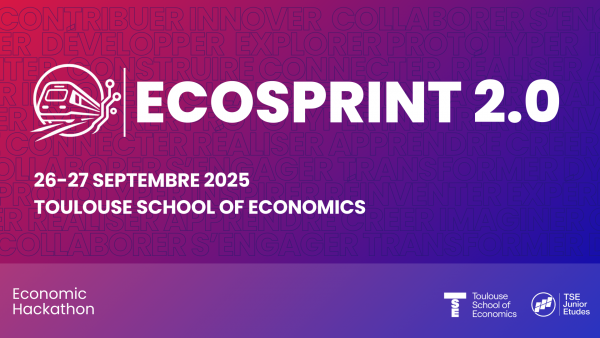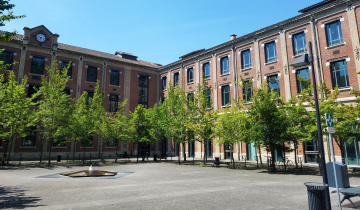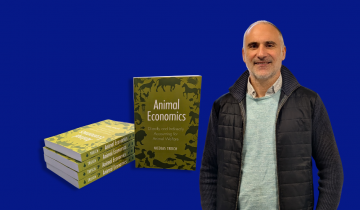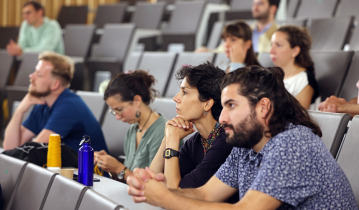The “Ecosprint 2.0” event, organized by TSE Junior Etudes, the junior enterprise* of the Toulouse School of Economics, was a resounding success on Friday, September 26, and Saturday, September 27, at TSE. Dedicated to the crucial topic of rail transport, this hackathon mobilized the ingenuity of Toulouse students in the face of a major challenge for France's ecological and economic transition.
Multidisciplinary teams brought together to tackle a bold issue
The event focused on a bold issue: how to remove the barriers to the development of rail freight in France. The teams were asked to come up with concrete solutions to develop this sector, a subject that is often overlooked, but which the participants found “challenging.”
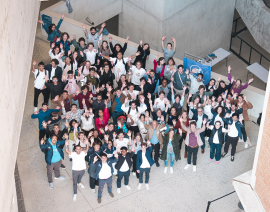 A total of 55 students, divided into 11 teams took up this challenge. They came from eight different schools or universities based in Toulouse: ENSEEIHT, INSA, IUT Paul Sabatier, TBS Education, Toulouse School of Economics, Toulouse School of Management, Université de Toulouse, ISAE-SUPAERO. They had nine hours to mobilize their creativity and propose innovative and sustainable solutions.
A total of 55 students, divided into 11 teams took up this challenge. They came from eight different schools or universities based in Toulouse: ENSEEIHT, INSA, IUT Paul Sabatier, TBS Education, Toulouse School of Economics, Toulouse School of Management, Université de Toulouse, ISAE-SUPAERO. They had nine hours to mobilize their creativity and propose innovative and sustainable solutions.
The initiative was supported by major partners in the sector, SNCF Group and Getlink, as well as TSE Infrastructure & Network Center.
An intense day, marked by teamwork and expert support
The kick-off took place on Friday, September 26, early in the evening with the presentation of the hackathon’s theme. After a convivial moment to allow the teams to get to know each other, work began early on Saturday morning. After an intense day, marked by multidisciplinary teamwork and expert support, each team presented its work to the juries which selected three finalist teams based on three main criteria: an innovative solution / relevance, feasibility, rigor / final presentation, pitch, and questions. These finalist teams then successively pitched their projects in a few minutes in the main auditorium, to be judged by the audience, which included all the students, experts, and jury members.
This whole agenda was masterfully prepared and led by the Junior Enterprise team, responsible for this 2nd edition of the hackathon. This represents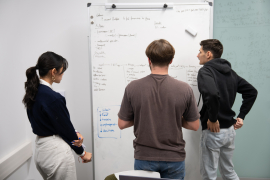 several months of preparation, this year with the special commitment of Maëlys Rapenne, Clémence Desanneaux, Anna Lebrun, and Nathan Vidal, Loan Rottier and Mathis Arguel.
several months of preparation, this year with the special commitment of Maëlys Rapenne, Clémence Desanneaux, Anna Lebrun, and Nathan Vidal, Loan Rottier and Mathis Arguel.
François Poinas, Dean of Education at TSE, and Vicky Barham, the new TSE Director as November 1st, who took part in the hackathon applauded this wonderful initiative by the TSE Junior Enterprise. They both highlighted the value for students to gain hands-on experience with real-world issues and engage directly with professionals.
FretFlow, the winning project
The ideas proposed by the students were varied and innovative. They included data sharing, the creation of a platform centralizing the different stages of a journey, and solutions aimed at encouraging SMEs to use rail transport.
Among the proposals from the 11 teams, three projects stood out:
- Flashfret: focused on urgent shipments by filling existing convoys.
- Deviation project: a solution for optimizing and streamlining rail freight.
- Fretflow: consisting of the implementation of a platform to optimize multimodal transport.
Congratulations to the FretFlow team, which received the most votes! The team included Thomas Gay (TSM), Saad Guessous (ENSEEIHT), Noah Husson (TSE), Léo Lacombe (University of Toulouse 1), and Bonnie Kézia Owono (TSE).
Their winning proposal revolved around a multimodal planning platform aimed at streamlining exchanges between rail and road carriers and facilitating access to freight for SMEs.
All three finalist teams received prizes, with TSE’s Junior Enterprise having prepared presents worth a total of €4,500.
A round table to continue the discussion
Ahead of the final pitch session by the three finalist teams, the final vote, and the announcement of the winners, TSE’s Junior Etudes led an engaging roundtable discussion with high-level experts.
In attendance were Julie Bagur (Director of Development at Getlink), Paul Mazataud (Director of Freight at SNCF Réseau), and Marc Ivaldi (Professor at TSE). The experts discussed the levels of action that could be mobilized to accelerate the sector's transition. Julie Bagur, joined for the day by Anne-Sophie de Faucigny (Director of Communications at Getlink Group), shared Getlink's vision of sustainable performance in the service of decarbonization.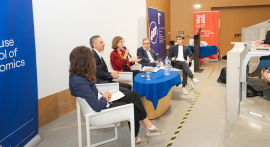
For Getlink, the participation in this hackathon was a continuation of its research partnership with TSE, which began in 2022. The company reaffirmed its belief that the transition to low-carbon transport relies on innovation, cooperation, and collective commitment—from researchers to students, from businesses to institutions. SNCF Réseau is also a company with which TSE has a longstanding cooperation, through a research partnership conducted under the aegis of the TSE Infrastructure & Network Center.
Check out TSE’s Junior Enterprise Instagram account for more information on Ecosprint and the hackathon's presentation slides.
*student-run consulting firm

